
‘Radio Alcatraz’ tells island’s stories
SAN FRANCISCO— The last thing that you would imagine coming out the Alcatraz Island National Park Service staff offices of the historical Alcatraz Island would be an interactive media outlet like a podcast.
But there, squeezed between the bookshelves, coffee machine and conference table, sits a digital recorder, mixer, microphone and a man determined to share Alcatraz’s rich history with the world, interactively.
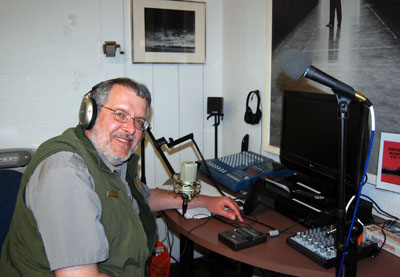 |
Ranger Craig Glassner greets a visitor at his office on Alcatraz Island (Photo by Alcione Gonzalez). |
“If I reach one person I’m happy. If I’m able to reach five people, I’ve done a good job. It’s part of my job,” said Craig Glassner.
The online community might know him as Ranger Craig.
Craig has been working for Alcatraz Island for the last 15 years as a ranger for the Golden Gate National Recreation Area, of which Alcatraz Island is a part, and as a technological innovator.
Glassner has always been interested in technology, attributing his childhood love for science fiction literature.
His love thus allowed him to be the mastermind behind the first podcast, titled Radio Free Alcatraz, to come out of the National Park Service system.
This isn’t surprising behavior from Glassner, who was mainly responsible for launching the first website of the National Park Service system, along with “We Hold The Rock,” a 35-minute video exhibit about the 1969-71 Indian occupation of Alcatraz.
“As soon as the Internet was available, I got rid of my old Atari computer and got an IBM computer because the Atari couldn’t handle the new Internet.” Glassner said. “I immediately felt that the Internet was going to be a revolutionary communications device. I knew the potential.”
| Ranger Craig Glassner at his desk on Alcatraz Island (Photo by Alcione Gonzalez). |
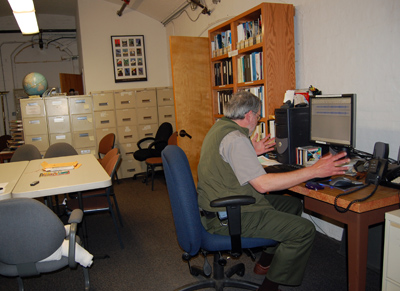 |
The website was launched in 1994 with the help of volunteers that Glassner recruited through postings on the older form of the Internet called Usenet.
“I put a message on the message board for the Bay Area, and it said “Would you like to spend a night at Alcatraz Island and work on a new website? Give me a call!”
His posting immediately received a flurry of responses and the website was born over night.
“On an island with miserable phone service, we had to smuggle a modem to do it, but literally overnight we were online the next morning,” said Glassner.
At first, Golden Gate NRA and National Park Service officials were hesitant about a Web site or any online content.
“It took them a while to get used to it, but they soon realized that this was the future.”
Glassner was obviously onto “something,” he said, because soon after the Internet and World Wide Web grew exponentially and now it is NPS policy for each park service unit to have a website.
Now, more than 10 years later, blogs and podcasts are new additions to the mix.
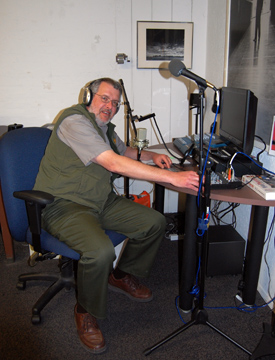 |
Ranger Craig Glassner at his recording space for Radio Free Alcatraz (Photo by Alcione Gonzalez). |
“Podcasting has been able to make the world a much smaller place where people can communicate more directly, without filters of corporations. I think that the concept is an amazing advancement.”
The rough-draft podcast, which Glassner is still tweaking, is posted on the Alcatraz Island National Park Service website (http://www.nps.gov/alca). It’s composed of an interview with a prison era volunteer, music from Arigon Starr (“Native American Diva”) and Abbott and Costello, and an explanation of the Alcatraz name by Glassner.
“The podcasts will allow us get out interviews that we have in our archives of formers inmates or Indians who occupied Alcatraz. They’ll also allow almost anyone in the world access to that material, material that would normally sit in a historical vault,” said Glassner.
Glassner took inspiration for the name Radio Free Alcatraz, from the November 1969 Indian occupation of the island where Jon Trudell, the poet and musician gave live radio broadcasts through Radio Pacifico.
Thus the podcast aptly titled Radio Free Alcatraz is a work in progress with Glassner constantly tweaking, editing sound and adding more content to the podcast.
Along with editing, Glassner is open to feedback to improve the podcast and future ones.
Glassner hopes to launch an accompanying blog soon to supplement the podcast, allowing the web site to be even more interactive.
| Water surrounding the island makes the Internet connection difficult at times (Photo by Alcione Gonzalez). |
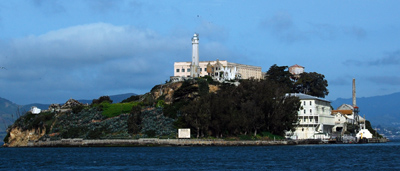 |
“One of the things that makes a podcast successful is having a website and a blog with it,” said Glassner. “Basically, I want to be able to reach out to people who will never be able to come to Alcatraz.”
It seems like Glassner is on the right track. To listen to the podcast and provide feedback, check out http://www.nps.gov/alca.
To Download Radio Free Alcatraz:
- Click on the “Radio Free Alcatraz” link.
- On Macs: Pop-window appears.
- On PCs: You need Windows Media Player to hear the podcast.
If You Go to Alcatraz Island:
- Hour of operation vary with the season but departures are every half hour throughout the day beginning at 9 a.m.
- Open everyday except Christmas Day and New Year’s Day.
- Wear layers, the weather varies on Alcatraz Island.
- Buy tickets in advance because they sell out quickly.
- There is no food service on the island, only bottled water is available for purchase.
- Entrance is free to the island except the ferry ticket that must be purchased.
- Prices: $39.25 for children, $55.25 for seniors and $56.50 for adults and juniors.
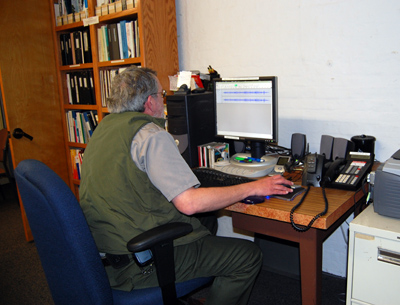 |
Ranger Craig Glassner works on the Radio Free Alcatraz (Photo by Alcione Gonzalez). |

Comments are Closed